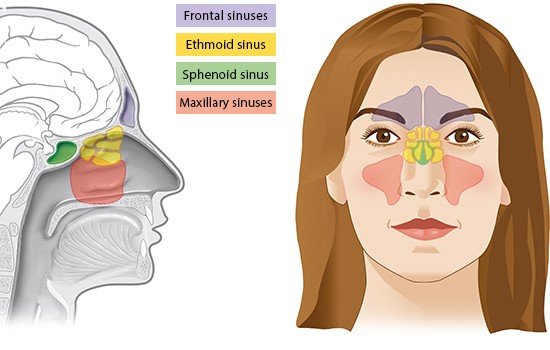Chitsuthipakorn W, Kanjanawasee D, Hoang MP et al. Benefits of nasal saline treatment in acute rhinosinusitis: Systematic review and meta-analysis. Int Forum Allergy Rhinol 2022; 12(8): 1006-1017.
Chong LY, Head K, Hopkins C et al. Intranasal steroids versus placebo or no intervention for chronic rhinosinusitis. Cochrane Database Syst Rev 2016; (4): CD011996.
Chong LY, Piromchai P, Sharp S et al. Biologics for chronic rhinosinusitis. Cochrane Database Syst Rev 2021; (3): CD013513.
Deutsche Gesellschaft für Hals-Nasen-Ohren-Heilkunde, Kopf- und Hals-Chirurgie (DGHNO-KHC), Deutsche Gesellschaft für Allgemeinmedizin und Familienmedizin (DEGAM). Rhinosinusitis (S2k-Leitlinie, in Überarbeitung). AWMF-Registernr.: 053-012. 2017.
Lemiengre MB, van Driel ML, Merenstein D et al. Antibiotics for acute rhinosinusitis in adults. Cochrane Database Syst Rev 2018; (9): CD006089.
Liu L, Pan M, Li Y et al. Efficacy of nasal irrigation with hypertonic saline on chronic rhinosinusitis: systematic review and meta-analysis. Braz J Otorhinolaryngol 2020; 86(5): 639-646.
Rimmer J, Fokkens W, Chong LY, Hopkins C. Surgical versus medical interventions for chronic rhinosinusitis with nasal polyps. Cochrane Database Syst Rev 2014; (12): CD006991.
IQWiG health information is written with the aim of helping people understand the advantages and disadvantages of the main treatment options and health care services.
Because IQWiG is a German institute, some of the information provided here is specific to the German health care system. The suitability of any of the described options in an individual case can be determined by talking to a doctor. informedhealth.org can provide support for talks with doctors and other medical professionals, but cannot replace them. We do not offer individual consultations.
Our information is based on the results of good-quality studies. It is written by a team of health care professionals, scientists and editors, and reviewed by external experts. You can find a detailed description of how our health information is produced and updated in our methods.


